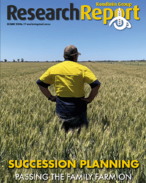This article is 2 years old. Images might not display.
The National Heavy Vehicle Regulator (NHVR) has registered the Managing Effluent in the Livestock Supply Chain Code of Practice in partnership with the Australian Livestock and Rural Transporters Association (ALRTA).
The code includes a practical guide and clear ‘chain of responsibility' for the entire supply chain to reduce the hazards and risks associated with effluent spillage during the transport of livestock.
"Historically livestock transport drivers have been left solely responsible for managing livestock effluent in transit," ALRTA president Scott McDonald said.
The code articulates measures which can reduce effluent accumulation and spillage at each stage of a land transport journey - from preparing livestock for transit to unloading - without impacting animal welfare.
Stakeholders from the livestock industry collaborated with ALRTA to develop the code to help them meet their primary duty and other obligations under the Heavy Vehicle National Law (HVNL) when managing livestock effluent during road transport.
"This is a supply chain problem which has required a supply chain solution," McDonald said.
The NHVR is currently working with stakeholders to develop further industry codes of practice, and welcomes enquiries and suggestions about other new codes.
The Code of Practice can be viewed here: https://bit.ly/3Y93kKy






















